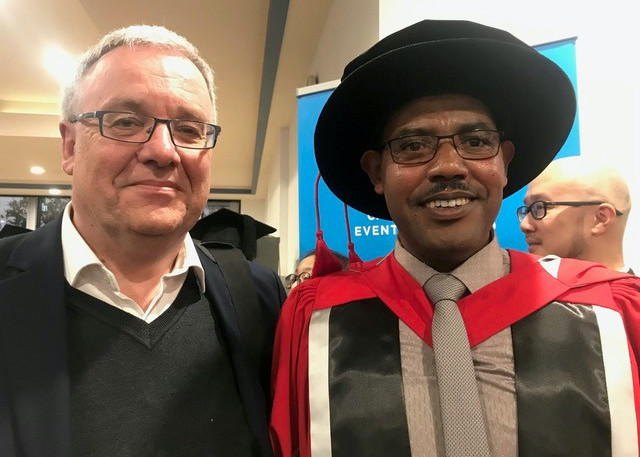
CHRISTOPHER GILBERT speaks to a couple of Australians who are among those heading up the work of the Langham Partnership in supporting the development of the church across Africa, Asia and Latin America…
When the late Rev Dr John Stott requested leave from All Souls Church in London to go to the “Majority World” – those parts of the world where most of its population live – the church said yes even though the destination at that stage was unknowable. Stott was responding to a call for assistance from African, Asian and Latin American ministry friends who wanted input from mature Christians in their churches.
The locus of Christian growth had already started to shift to those regions from the West, following hundreds of years of Protestant missionary work, firstly by Europeans, then British and North Americans. Stott, in heading into this world, was reading the moment.
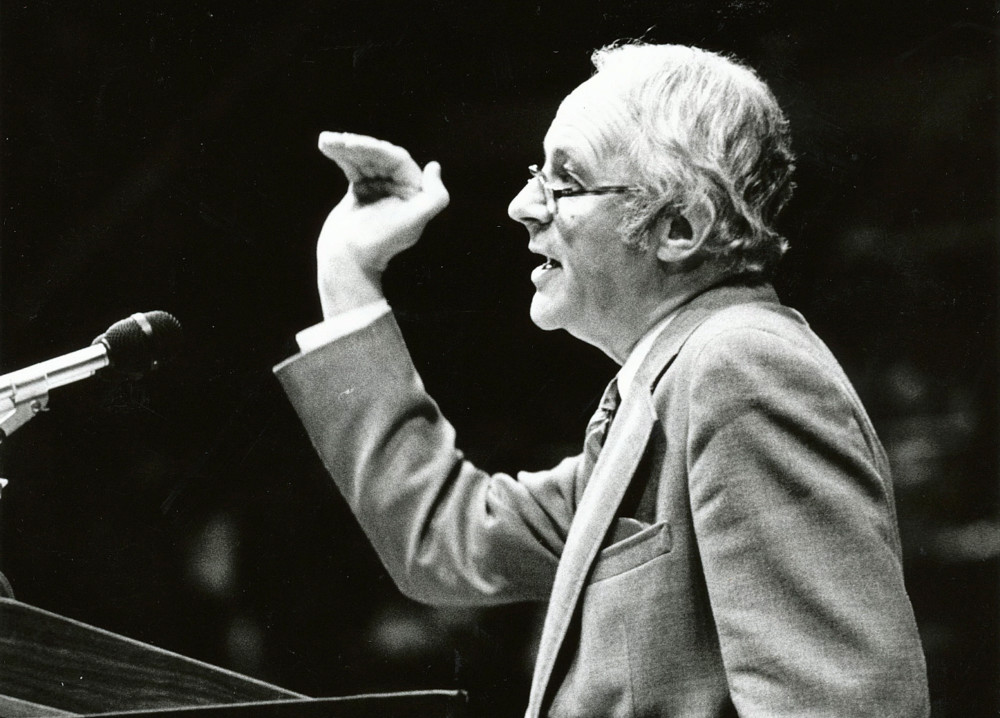
John Stott, founder of the Langham Trust which has become The Langham Partnership. PICTURE: Langham Partnership.
The organisation he founded, the Langham Trust, has followed suit. Starting almost invisibly in 1969 (the name comes from Langham Place where All Soul’s is located in London), it has since evolved into today’s Langham Partnership, along the way providing doctoral scholarships for almost 400 Indigenous theologians, publishing Indigenous language books and materials, and designing a mushrooming program of quality preaching and Bible training at the grassroots level, much of which goes under the radar of many Western churches.
Yet the need remains great.
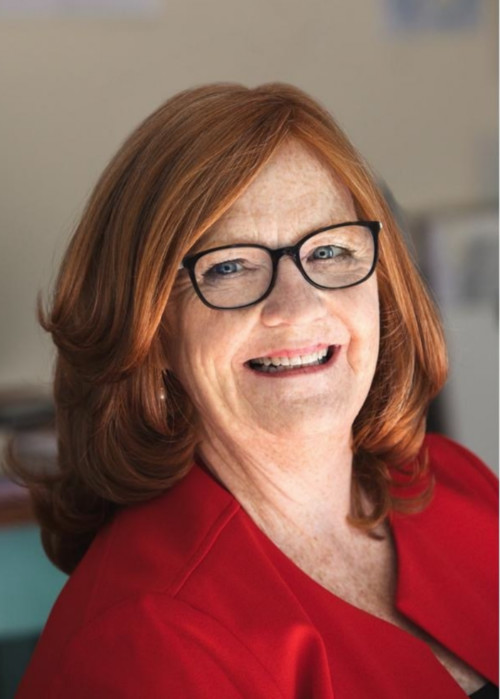
Jill McGilvray, chair of both the Langham Partnership International Council and the Langham Partnership, Australia. PICTURE: Langham Partnership.
“What drew me to Langham’s Ministry is it gives voices to people in the global church themselves. So it helps their voice be heard.”
– Jill McGilvray, chair of the Langham Partnership International Council.
While many in the West believe that secularism is on the rise and Christianity is in decline, global data shows that the truth is actually the reverse. Religion across the board is on the rise and Christianity and Islam lead that growth.
Peter Crossing, an Australian working as data analyst for World Christian Database, says that the global rate of growth in the number of new Christians is increasing. From 2015 to 2020 the number of new Christians per day averaged 185,000,” Crossing says. “The equivalent figure in 2011 being 170,000.”
Jill McGilvray, chair of the Langham Partnership International Council and chair of Langham Partnership Australia, says this growth is mostly in Latin America, Africa, Asia and the Middle East. And while many Christians in countries like Australia – McGilvray is from Wentworth Falls in New South Wales – may not be aware of Langham’s work, she says that after 50 years of presence in the majority world, the Langham name is widely recognised across churches and theological schools.
“What drew me to Langham’s Ministry is it gives voices to people in the global church themselves,” she says. “So it helps their voice be heard.”
McGilvray reels off names like Gladys Mwiti, Riad Kassis, Femi Adeleye, Havilah Dharamraj and Rula Khoury Mansour – theologians and graduates of Langham’s scholars program doing remarkable work in their own regions, some for decades. And then there’s Yohanna Katanacho, a Palestinian professor of the Old Testament working in Israel and recipient of a Langham scholarship from the majority world.
Katanacho was born in the Palestinian quarter of old Jerusalem in 1967. He grew up as a distrusted minority citizen in the state of Israel in the midst of Arab/Israeli warring, bombings and reprisals. From leading the atheist society at university, he is now professor of the Old Testament at Nazareth Evangelical College and teaches at Bethlehem Bible College. He is also the editor and major contributor to the Old Testament section of a recently published Arabic language Bible commentary published through Langham’s Literature program. Available in Egypt and the Arab world, and warmly received also by Muslim scholars, the commentary is not yet available in English. Fluent in Hebrew, Katanacho has also written a commentary in Arabic and English on the Gospel of John and a poetic rewriting of the Psalms as prayed through his own Palestinian heart which are available online.
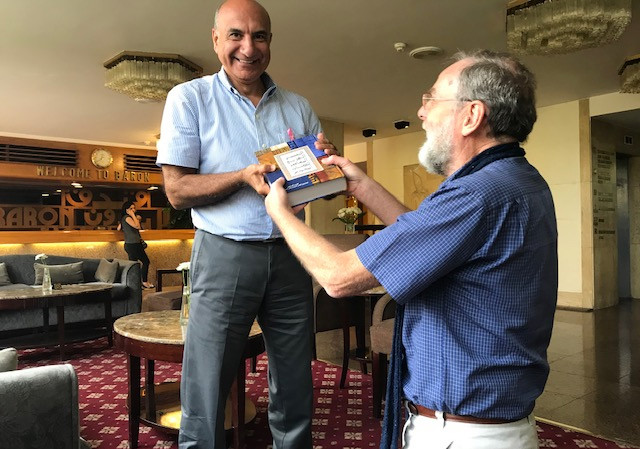
Riad Kassis receives an Arabic Bible Commentary from Pieter Kwant, director of Langham Literature. PICTURE: Langham Partnership
It is the maturity of the faith of people like Katanacho – a faith which is learnt in very hard places through suffering, that drew Jill McGilvray into the role of chair on Langham Partnership’s International Council.
Gillean Smiley, CEO of Langham Partnership, Australia – one of the six Langham Partners on the International Council which governs the movement, also says she was drawn to the organisation by the quality of Langham scholars and the work they immerse themselves in.
“I have to say in a normal human life, if you’re lucky you meet one or two people [of whom] you think, ‘That was a privilege and an honour and a lifetime highlight to meet that person,’” says Smiley, who is from Adelaide. “I’ve met numbers of [Langham] scholars now and every single one falls into that category of: ‘I can’t believe that I have the privilege to have met this person’. And, as a cohort, they are doing the most extraordinary things, making the most extraordinary contributions to the global church and also their own local environment.”
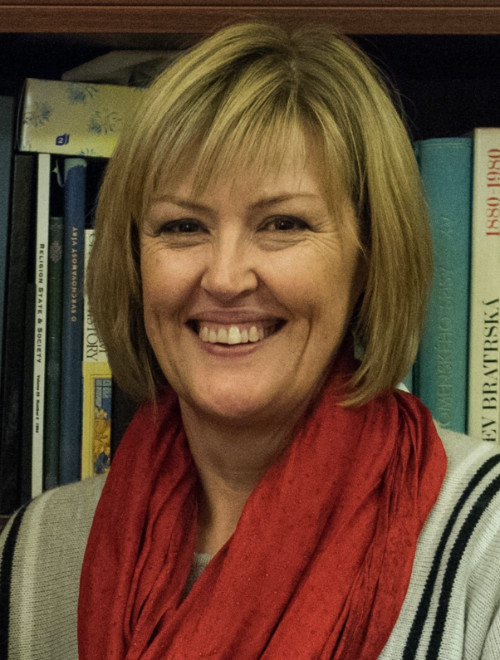
Gillean Smiley, CEO of Langham Partnership, Australia. PICTURE: Langham Partnership.
“I’ve met numbers of scholars now and every single one falls into that category of: I can’t believe that I have the privilege to have met this person. And as a cohort they are doing the most extraordinary things, making the most extraordinary contributions to the global church and also their own local environment.”
She illustrates this with the story of Anwar Berhe, an Ethiopian who, under a scholarship from Langham Partners Australia, completed his doctorate in Melbourne in 2019. As a young Muslim he went to Addis Ababa on a university scholarship but through a frightening dream, felt led to seek out a Christian. Three years later he found one, and returned home to his family as a follower of Jesus, reading his Bible secretly in the bush. His family eventually forced him to confess his conversion and sorrowfully negotiated the timing of his death at their hands. They delayed their decision-making. In the meantime, Berhe was forced into life as a beggar.
Things changed when a local man – paralysed from waist down in an accident and unable to be helped by the hospital, the mosque or the local witchdoctor – was, surprisingly, brought to Berhe, the beggar Christian, for help. The intention was clear – Berhe’s failure to heal the man would provide justification for his execution.
“So they turned up and said ‘Can your God heal?’, and Anwar, with no teaching or opportunity to learn, basically opened his Bible and said, ‘Ah yes, my God can heal,’” relates Smiley.
Berhe prayed and the man was healed.
“And Anwar said that on that day many people in the village believed but only the man who was healed became a follower,” Smiley adds.
The number of Christians in the region was now two people, but then Berhe’s brother and another man converted in a clandestine meeting at night, making four.
“Today there are 36,000 Christians,” Smiley says shaking her head, still amazed by saying it. She admits she was sceptical of the high number, considering it might have been the result of an error in translation. But Berhe assured her that it truly is “three, six, and three noughts”.
“He was personally involved in the planting of 18 churches in the region.”
Berhe was later granted a Langham scholarship and completed his PhD at the Melbourne School of Theology.
“He returned to Addis Ababa where he has established a university program for evangelism of muslims in North Africa,” says Smiley. “And with all that life experience, he’s maybe [in his] late 30s.”

Bishop Paul Barker with Anwar Berhe in his doctoral robes. PICTURE: Langham Partnership.
Australia is just one of six nations – the others being the UK, Canada, the US, Hong Kong, and New Zealand – where Langham Partners are based and collaboratively take responsibility for funding three programs: equipping scholars, developing literature resources and training preachers.
“John Stott began the Langham Trust and for a long time he pretty much personally funded it,” says McGilvray. “He funded it from every penny of his royalties, and any honorarium he was ever given for speaking all went into the trust. So it became very big before others had to help fund it.”
In the 1990s, that role became the responsibility of the partnership’s affiliates.
Gillian Smiley explains that the issue for founder Stott and the ongoing partnership has always been that the exploding growth of the global church requires mature leadership, something that occurs when followers hear and understand the word of God. The Langham logic, she explains, is that this “growing up” happens best through a church’s native leadership and in their own languages.
The success of Langham’s programs can be seen in a recent project which measured the impact of three initiatives using a grant received by Langham’s US partner.
It found that, having completed their studies, 91 per cent of Langham scholars returned to their own countries to pursue the 10 year investment of their efforts there which is required under the terms of their scholarship. Smiley says it compares against a 60 per cent return home rate for most Christian education scholarships and 20 to 30 per cent for secular scholarships.
“Of the almost 400 scholars, 42 per cent of them have written the first Christian material in their language other than the Bible,” Smiley reports.
Figures from a 2017 report commissioned by the partnerships also reveal that 64 per cent of the scholars who take part in Langham’s programs are planning to write a book needed in their home country and 84 per cent develop new ideas for how to improve theological education in their home country.
But the accomplishment that especially animates both McGilvray and Smiley is the publication, through Langham Literature, of gloriously illustrated whole Bible commentaries in the languages of African nations, in Arabic for the Middle East, in Slavic for Central European nations, and for South Asia, a commentary in English – all written by scholars indigenous to the regions. This too meets the moment where figures from the Center for the Study of Global Christianity in the US state of Massachusetts reveal global literacy is at 84 per cent and will reach 88 per cent by 2050.
McGilvray and Smiley are also looking forward to the leadership of the incoming international director of Langham Partnership, Tayo Arikawe, who, coming from Nigeria, will be the first international director of the partnership’s work from a majority world country.
“As the person who led the search committee tasked with finding the person to fill this role [comprising nine people from seven countries], I can say that we were entirely unanimous in our decision and each of us described being very aware of God’s leading,” says McGilvray. “Tayo is a deeply godly and prayerful man, with a wonderful relational manner and a brilliant strategic mind. He is delightful and we all look forward to his leadership of Langham Partnership into the future.”
It’s just another sign that, 52 years after it was founded, the Langham Partnership remains true to Stott’s legacy of reading the moment.
Corrections: Pieter Kwant’s name has been corrected in a picture caption as has the nations where Langham Partners are based and a statement re where Langham scholars completed studies in the US has been clarified.





